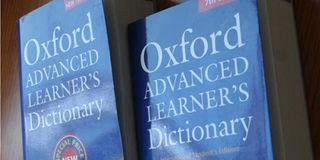A historical event does not necessarily become historic

Copies of Oxford Advanced Learner's dictionary. PHOTO | PHOEBE OKALL | FIEL |
What you need to know:
For its part, to be historic is either to take place for the first time ever in a given situation or after a very long time, or to have unprecedented consequences upon a given time-place.
In the history of a planet, to be historical is merely to take place both in time and in place, whereas to be historic is to take place either uniquely or only for the first time ever.
On one page, a Nairobi daily newspaper said a recent Kenyan election had been “historic”. B-right-o! Yet on another page the same issue said the same election had been “historical”. To be sure, the two adjectives are English. Yet the question stared at you as menacingly as Medusa’s face: Which is which? Or does the adjective historic mean the same thing as the adjective historical?
The answer to the latter question is a decisive no. To be quite sure — as we have seen here a myriad of times before — both adjectives do exist in English. The only problem (even for many people for whom English is the mother language) is that the adjective historic and the adjective historical do not mean the same thing.
But, although we have seen it here a million times before, let us say it again. To be historical is merely to exist or to take place both in time and in place. That makes historical everything that has taken place and will take place Ever Since Time Began.
LONG TIME
I cap the initials of that last phrase and italicise the whole phrase because it is the title of one of the pseudo-science books by an excited European myth-monger called Zechariah Sitchin.
For its part, to be historic is either to take place for the first time ever in a given situation or after a very long time, or to have unprecedented consequences upon a given time-place.
For the people of Japan’s Hiroshima, the American atom bomb was historic in a double way. It was the first time that human beings had ever hurled such a chimeric weapon upon other human beings.
Moreover, it killed more human beings than any other man-made weapon had ever killed in humankind’s often amazingly greedy and infinitesimally small-minded intra-specific squabbles.
KILLED MORE MEN
Ever since the species homo sapiens sapiens elbowed its evolutionary way onto our planet, man-self-declared-the-wise may have killed more men, women and children than an anopheles or a cobra has ever killed.
Two cheers, then, for mankind’s noisy self-proclamation as the most intelligent — and even the wisest — species that our planet has ever produced. Any Martian observer of the human situation would laugh uproariously at humanity’s chest-thumping self-declared sapience (“wisdom”) and science (knowledge).
WEAPONS
With the deadliest self-made nuclear and other such weapons in its hands, a species notable for wisdom would not involve itself in such intra-specifically perilous and self-defeating activities as colonialism and in a national labour system which amounts to open robbery of other human beings.
Let us reiterate it. In the history of a planet, to be historical is merely to take place both in time and in place, whereas to be historic is to take place either uniquely or only for the first time ever. That was what made historic the bomb that the United States hurled upon the human beings of what a horrified French writer later mourned as Hiroshima Mon Amour (“Hiroshima Darling”).
Philip Ochieng is a retired journalist. [email protected]





